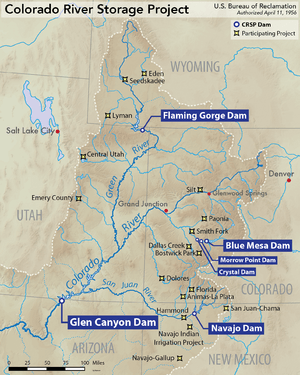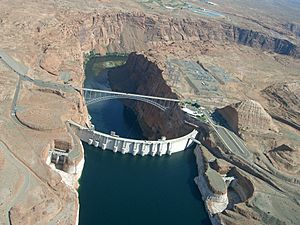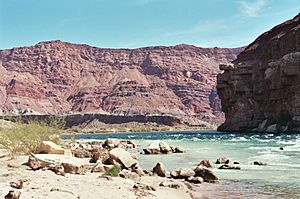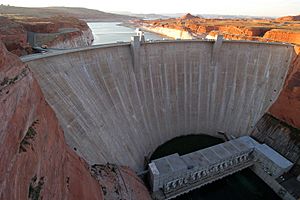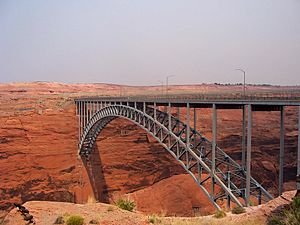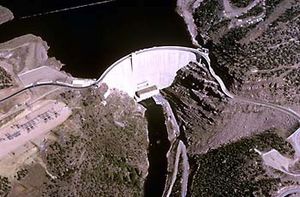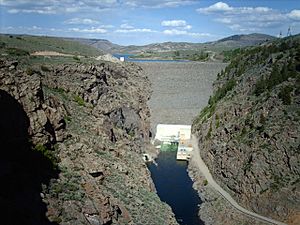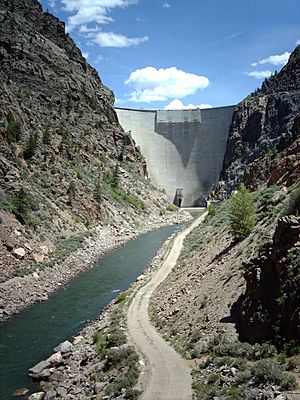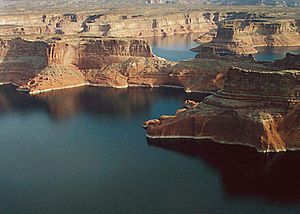Colorado River Storage Project facts for kids
The Colorado River Storage Project is a big plan by the United States Bureau of Reclamation. It helps manage the water in the upper part of the Colorado River basin. This project provides electricity from water, helps prevent floods, and stores water. It serves states along the upper Colorado River and its main branches.
The project started in 1956. Since then, it has grown to include many other water management projects. Its main focus is on the upper Colorado River itself. It also includes the Green River, the San Juan River, and the Gunnison River.
The states that are part of this project are Arizona, Utah, New Mexico, Colorado, and Wyoming.
Contents
History of the Colorado River Project
People first tried to manage water in the upper Colorado River basin in 1854. This happened at Fort Supply in Wyoming. Water was taken from Blacks Fork to water local farms. Later, the Bureau of Reclamation (then called the Reclamation Service) started looking into how to develop the river system in 1902.
The project became serious when the Colorado River Compact was signed in 1922. This agreement was made by the upper basin states and the lower basin states. These lower states are California and Nevada. The compact said that the upper states had to send at least 7.5 million acre-feet of water each year to the lower states.
However, the amount of water flowing in the Colorado River was very different each year. At Lee's Ferry in Arizona, the river's flow could be from 4 million to 22 million acre-feet. This made it hard for the upper states to send enough water in dry years. They also lost a lot of extra water in wet years.
To control the river's flow, a study was done. It showed that many dams and reservoirs were needed. These would be built on the river and its branches. In 1950, a report with ideas for these projects was given to the United States Congress. This was a team effort by the Upper Colorado River Commission and other groups.
One idea was to build a dam on the Green River in Echo Park. This area is part of Dinosaur National Monument in Colorado. This idea caused a lot of debate. Sierra Club leader David Brower started a big campaign to save the park. As a result, the Echo Park Dam plan was dropped. Instead, a dam was planned for Glen Canyon, Arizona. Brower later said this was a big mistake because he had not seen Glen Canyon before agreeing.
A slightly smaller plan was approved by Congress in 1956. This law called for building dams and reservoirs at Curecanti in Colorado, Flaming Gorge in Wyoming, Navajo in New Mexico, and Glen Canyon in Arizona. All but the Navajo project would make electricity. The Navajo project was only for flood control. The law also included other related projects in the Colorado River basin.
How the Project Works
The Colorado River Storage Project has four main parts. These are spread across the upper Colorado basin and its major rivers. Many other smaller projects are also part of the system.
Together, the system can store about 34 million acre-feet of water. This water is released when the river's flow is low. This helps meet the water delivery rules of the Colorado River Compact. Also, three of the main parts create hydroelectric power for cities in the southwest.
Lee's Ferry in Arizona marks the southern end of the project. The project covers the Colorado River and all its branches upstream from this point.
Glen Canyon Unit
The Glen Canyon Unit is the biggest and most important part of the project. It includes the Glen Canyon Dam, Lake Powell, and the Glen Canyon Powerplant. The dam is near Page in northern Arizona. Most of Lake Powell is in southern Utah. Lake Powell can hold 27 million acre-feet of water. This is over 64% of all the water the project can store. The dam's power generators can make 1,296 megawatts of electricity. This is almost 75% of the project's total power.
Even though it's very important, the Glen Canyon Unit has caused disagreements. This started before it even opened in 1964. David Brower, who helped choose the dam's location, later said he regretted it. Former Arizona Senator Barry Goldwater also changed his mind about supporting the project. Some environmental groups now want to drain Lake Powell and bring back Glen Canyon. Groups like Living Rivers and Friends of Glen Canyon support this. Other groups, like Friends of Lake Powell, are against it.
The Glen Canyon Unit is important for the project and for tourism. So, there are no plans to stop its operations.
The Glen Canyon Dam Bridge was built over the river in 1959. It was not directly part of the project but was built because of it. When it was finished, it was the highest arch bridge in the world. Today, it is one of only two bridges that cross the Colorado River between Lake Mead and Lake Powell. It carries most of the traffic between northern Arizona and southern Utah.
Flaming Gorge Unit
The Flaming Gorge Unit includes the Flaming Gorge Dam, the Flaming Gorge Reservoir, and the dam's powerplant. The dam holds back the Green River near Dutch John, Utah. Parts of the reservoir extend into Southern Wyoming near the city of Green River.
The dam was finished in 1964. It stores water and makes electricity. It also helps control floods on the Green River, which is a main branch of the Colorado River. The powerplant at the dam can make 153 megawatts of electricity. This is about 8.5% of the whole system's power.
The Navajo Unit has the Navajo Dam and the Navajo Lake reservoir. The dam holds back the San Juan River near Farmington, New Mexico.
The dam was finished in 1963. It was the first part of the project to be completed. Unlike the other dams, Navajo Dam did not make electricity when it was built. A small power plant was added in 1983. It can make 32 megawatts of power for the city of Farmington.
Aspinall Unit
The Aspinall Unit has three dams and reservoirs on the Gunnison River in Colorado. It is the only part of the project with more than one dam or reservoir.
The Aspinall Unit was first called the Curecanti Unit. It was renamed in 1980 for former congressman Wayne N. Aspinall. Aspinall strongly supported water projects in Colorado and the western US. He was a key person against David Brower in the fight to create the Colorado River Storage Project.
Overall, the Aspinall Unit can make about 290 megawatts of electricity. This is about 17% of the entire Colorado River Storage Project's power. It is the second most productive unit after Glen Canyon.
Blue Mesa Dam
The Blue Mesa Dam holds back the Gunnison River. It is upstream from the Morrow Point Dam. It forms the Blue Mesa Reservoir. This makes it the first dam the river passes through. The dam was finished in 1966. It can make 86,400 kilowatts of electricity. This is about 30% of the Aspinall Unit's power.
Morrow Point Dam
The Morrow Point Dam holds back the Gunnison River. It is downstream from Blue Mesa Dam but upstream from Crystal Dam. It forms the Morrow Point Reservoir. This puts it in the middle of the Aspinall Unit. Finished in 1968, Morrow Point is the largest and most productive of the Aspinall dams. It can make 173,334 kilowatts of electricity. This makes it the second most productive dam in the whole Colorado River Storage Project. It provides about 60% of the Aspinall Unit's power.
The Morrow Point Dam was also the first thin-arch concrete dam built in the Colorado River Storage Project.
Crystal Dam
The Crystal Dam holds back the Gunnison River about 6 miles (10 km) downstream from the Morrow Point Dam. This makes it the last dam in the Aspinall Unit. It was finished in 1976. It was the last dam in both the Aspinall Unit and the Colorado River Storage Project to be completed. This marked the final completion of the entire system.
Crystal Dam forms the Crystal Reservoir. It has the smallest power capacity of the hydroelectric dams in the system. It provides about 31,500 kilowatts of power. This is just over 1% of the Aspinall Unit's capacity.
Other Projects
Many other water management projects are considered part of the Colorado River Storage Project. These projects are linked financially to the CRSP. However, they are not main parts of the project itself.
Eleven projects were included in the 1956 law. Some of these include:
- Central Utah Project, with many dams and reservoirs in central Utah
- Lyman Project, on the Blacks Fork and Smiths Fork of the Green River, mostly in Wyoming
- Seedskadee Project on the upper Green River Basin in Wyoming
Later, more projects were added through changes to the law. For example, the San Juan-Chama Project was added in 1962. This project moves water from the San Juan River basin to the Rio Grande basin. The Navajo Indian Irrigation Project was also added.
Project Impact
Power, Water, and Fun
The four main parts of the Colorado River Storage Project can make up to 1,813 megawatts of hydroelectric power. This is similar to a very large power plant that burns coal.
The Blue Mesa and Navajo Dams were built mainly to control floods. By 1999, they had saved about $10 million in flood-related costs.
Also, the different parts of the project have created many chances for fun activities. These include boating, fishing, and camping in the dry southwest regions.
Changes to the Environment
The project has changed the natural environment in the Colorado River. This includes changes in Grand Canyon National Park. The Glen Canyon Dam especially has received a lot of environmental criticism.
Water held behind the dams becomes colder. It also drops its mud and sand in the reservoirs. Before the dams, natural floods of warm, muddy water flowed down the Colorado River. These floods created sandbars and beaches along the river's path and in its canyons. Now, the river has controlled releases of cold, clear water. This has caused sandbars in the Grand Canyon to wear away. These sandbars are important for wildlife. The changes have also affected the river's food web. Natural species are being replaced by species that are not native to the area. Efforts to create artificial floods started in the 2000s. But so far, they have not fully brought back the natural environment in the canyon.
The project has also changed the shape of the riverbed. Heavy loads of silt (fine sand and mud) are trapped behind the dams. This silt has filled up the canyons that were flooded. Now, as water levels in the reservoirs drop, this silt is coming to the surface.
Building large reservoirs and irrigation systems has increased the water's surface area. It also makes the water stay in the basin longer. This means more water is lost to evaporation. Some estimates say that 8.5 million acre-feet of water are lost each year. This is about the same amount of water that flows from Lake Powell to Lake Mead on average.
Water from the Colorado River now rarely reaches the Colorado River Delta. This is because of how much water is used and lost to evaporation within the project. The size of the river's mouth has shrunk from 3,000 square miles to less than 250 square miles. Species that are not native to the area have become common in the Delta. Losing this habitat has also affected marine life in the Gulf of California.
 | Selma Burke |
 | Pauline Powell Burns |
 | Frederick J. Brown |
 | Robert Blackburn |


